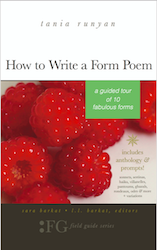Poet-a-Day: Meet Isaac Willis
I’m so excited to feature a young, up-and-coming poet like Isaac Willis in How to Write a Form Poem. When I was on my Great Sonnet Search, friend and poet David Wright, who also shares a sonnet in the book, recommended I drop his former student a line. I’m glad I did.
Here are the first six lines of Willis’s “A Sonnet for the Architect,” which he writes to his wife.
A Sonnet for the Architect (excerpt)
The site has been selected, so they dig,
to break in soft and untouched grass. So draw
the plan. Then draw again. You lay your wrist,
poor broken wrist near mine, so red, and all
among my pens and paper you—stopping—
glance over metaphors and images
to find that all my iambs were blocking…
—Isaac Willis
So what are his iambs blocking? You’ll have to read the rest of the sonnet in How to Write a Form Poem to find out!
Here’s what Willis has to say about his poem:
Tania Runyan (TR): Tell me a little about the origin story of “Sonnet for the Architect”:
Isaac Willis (IW): I wrote the first draft of “Sonnet for the Architect” about three years ago. My wife and I were newly married but living apart, and we were both searching for and applying to graduate programs. It was a time of unknowing for both of us. Really, it was also written with very pragmatic aims in mind—to beef up my writing portfolio. It happened to be the best poem I wrote during that season of my life, and my wife Andi really likes it, too.
TR: Why did you decide to write the poem as a sonnet? Or did you decide to write a sonnet first, and the poem grew out of that?
IW: It’s hard to remember exactly what form the poem first took, but it became a sonnet pretty quickly. It’s hard for me not to think of the shared aspirations of poets and architects. An architect has to think of a million things at once, but at the end of the day, she has to build a house that will stand. Poetic forms are kind of like different architectural styles. Some come in and out of vogue; the sonnet seems to be one of those forms poets can’t leave alone. When I realized I was writing a love poem about an architect, I knew the form couldn’t have been anything but a sonnet.
TR: What do you hope poets can learn from a book like How to Write a Form Poem?
IW: I hope poets learn how much possibility and play opens up when you decide to write in form. Iambic pentameter and a fixed rhyme scheme can feel very restrictive. To me, a sonnet isn’t so much a set of expectations or rules as a way to explore a new subject or troubling concept. Wanda Coleman and others have pushed up against what a sonnet must look like or can do for a long time. But for some reason, we all agree it’s a form worth writing in. Form poems are poems that you—and your readers—can live in. Like good houses, they’ll stand up.
About Isaac Willis
Isaac Willis lives and writes in downstate Illinois. His poems and essays can be found in The Cresset and The Bluffs Literary Magazine, among others.
He is currently an MFA candidate at the University of Illinois at Urbana-Champaign.
Photo by mini malist, Creative Commons, via Flickr. Post by Tania Runyan.
Browse more Poet-a-Day
Browse 50 States of Generosity
Check out The Yellow Wall-paper Graphic Novel
______________
How to Write a Form Poem: A Guided Tour of 10 Fabulous Forms

You’ll also be entertained by Runyan’s own travel stories that she uses to explain and explore the various forms—the effect of which is to bring form poetry down to earth (and onto your own poetry writing map)!
BUY HOW TO WRITE A FORM POEM NOW!
- Flowers of California: California Poppy - December 8, 2022
- Flowers of California: Lily of the Nile - October 13, 2022
- Flowers of California: Crape Myrtle - October 5, 2022


L.L. Barkat says
The Great Sonnet Search. That totally made me laugh.
Perhaps it was only exceeded by The Great Rondeau Search? (Gosh, there were so many searches for this book. Maybe we should have used archaeology as a thread along with travel. 😉 )
I loved this sonnet from Willis. The two kinds of architecture at play at once (his and Andi’s) somehow reminded me of a Donne love poem.
Tania Runyan says
So. Much. Searching. So glad I found Isaac’s!
Dixie Sanders says
I am so proud of my grandson Isaac Willis. I love the poem he wrote for his wife, Andi… beautifully intimate. Isaac is an old soul. Wise beyond his years.
Tania Runyan says
I agree, Dixie! And I love to see your excitement and support for his work. He has quite the poetry future ahead of him!